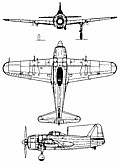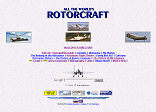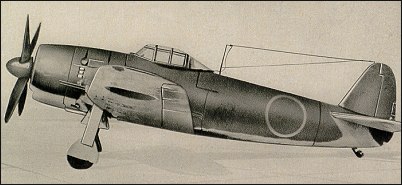|
| In 1941 Kawanishi was still engaged in
design of an attractive float-equipped
fighter, the Kawanishi N1K1, intended
as a naval fighter to support an island hopping
conquest in the Pacific without
dependence on carriers or shore
bases; in due course 98 of these
fighters (Allied reporting name 'Rex')
were produced. However, while their
design was still in progress Kawanishi
undertook a wheel-landing gear version,
designated the N1K1-J Shiden
(violet lightning). The prototype of the
new fighter was flown on 27 December
1942 powered by the new 18-cylinder
Nakajima Homare radial. Production
got under way in 1943 of the N1K1-J
with Homare 21 radial and an armament
of two 7.7-mm nose
guns and four 20-mm wing cannon (two
of which were carried in underwmg
fairings). Despite being plagued by
constant engine troubles and an inherently weak landing gear, the
Shiden was an excellent aircraft in
combat, proving an equal match for the
Grumman F6F Hellcat; given the reporting
name 'George' by the Allies, it
was widely considered to be one of
Japan's best wartime fighters. Three
other main production versions were
produced: the N1K1-Ja with nose guns
deleted and all cannon mounted inside
the wings; the N1K1-Jb with underwmg
racks for two 250-kg bombs;
and the N1K1-Jc with racks for four
250-kg bombs. A new version,
the N1K2-J, with improved landing
gear, redesigned airframe structure
and cleaner engine cowling,
appeared during the last year of the
war and proved even better than the
N1K1; an instance occurred when a
single Japanese pilot, Warrant Officer
Konsuke Muto, fought off 12 Hellcats,
shooting down four. A total of 1,435 N1K
Shiden landplane fighters was produced,

| MODEL | N1K2-J |
| CREW | 1 |
| ENGINE | 1 x Nakajima NK9H "Homare 21", 1365kW |
| WEIGHTS |
| Take-off weight | 4000-4860 kg | 8819 - 10715 lb |
| Empty weight | 2657 kg | 5858 lb |
| DIMENSIONS |
| Wingspan | 12.0 m | 39 ft 4 in |
| Length | 9.35 m | 31 ft 8 in |
| Height | 3.96 m | 13 ft 0 in |
| Wing area | 23.5 m2 | 252.95 sq ft |
| PERFORMANCE |
| Max. speed | 585 km/h | 364 mph |
| Cruise speed | 365 km/h | 227 mph |
| Ceiling | 10760 m | 35300 ft |
| Range | 1700 km | 1056 miles |
| ARMAMENT | 4 x 20mm cannons, 500kg of bombs |
 | A three-view drawing (750 x 1025) |
| Gus, e-mail, 07.03.2011 17:01 read Saburo Sakai's book, 'Samurai' which mentions this particular plane and nearly all the other Japanese fighters..... reply |
| Gus, e-mail, 07.03.2011 17:01 read Saburo Sakai's book, 'Samurai' which mentions this particular plane and nearly all the other Japanese fighters..... reply | | Ron, e-mail, 20.02.2011 10:04 If VF-85 lost 8 or 9 F4Us in 2 fights with N1Ks in June 1945, and only 3 Georges were lost, why are these not in the US Naval win-loss records? That's about 3 to 1 ratio in favor of the Shiden.
I can perhaps excuse it with US pilots misidentifying them as Tojos or something but that's embarrassing to me. I simply can't believe that. reply | | Ron, e-mail, 14.12.2010 01:08 1 kill vs 3 loss ratio was the confirmed record of Genda's outfit in the last months of WW 2. That's counting the Allied fighters of all types, not just US Navy and Marines where they had parity. It doesn't count ordinary N1K Shiden outfits.
So Spitfires, P-51s, and P-47s must have done better against Genda and his elite group of pilots than the US F6Fs, FMs, and F4Us did. reply |
|
| | Ron, e-mail, 29.11.2010 08:30 I am mystified by the lack of loss the USN records to the N1K Shiden 'George'. Historians credit the crack IJN 343rd with near parity of 1 to 1 ratio more or less vs the VF-82, -9, VBF-17, -VMF-23 between 12 /1944 and 3 /1945 and others in April. US Navy says 35 Shidens were shot down without loss to US Navy fighters 1944-45. Granted other less skilled Shiden outfits would score less than these did. Does anyone have the answer for the discrepancy? Perhaps unidentified or misidentified Japanese fighters were credited. The overall Shiden ratio is perhaps 13 losses per victory like the A6M according to Wikipedia. reply | | Mykola, 18.10.2010 17:23 An ideal plane for dogfihts! reply |
| Ron, e-mail, 01.08.2010 01:15 I see the 3 view drawing is the N1K1-J Shiden 11 with the triangular tail fin and the 2 cannon boots. Just over a thousand were built.
The photo is the later NiK2-J Shiden-Kai 21 with the lower set wings with all 4 wing cannon internally mounted. Just over 400 were built.
It was the result of Kawanishi deciding to go ahead as a private venture based on it's promising performance as a land based version of the Kyofu (Rex) floatplane fighter.
It was a timely decision and in the end of 1943 N1K1-J production was authorized by the Imperial Navy. The Zero's torch had been passed. reply | | Jackie, 08.08.2010 12:29 the N1K Shiden was truly a deadly opponent to the Allied fighters such as the F6F Hellcat and the F4U Corsair. It was one of the finest Japanese fighters of World War II. It was originally designed as a floatplane fighter but by 1943 aircraft of this type were not needed anymore. It has 4 20mm cannons and good armor protection. It will have been a very effective bomber destoryer had it not have a poor rate of climb and reduced engine performance at high altitude. reply | | Ron, e-mail, 09.08.2010 21:57 I was reading Pacific Fighters by Flight Journal about the George. Aces of the fighter were commenting on the N1K1-J tendency to autorotate. This handling problem could lead to an uncontrollable spin. Was this related to being tail heavy? With the N1K2-J redesign, I wonder if that fault was addressed successfully.
If anyone is familiar with this (with any fighter), any info would be welcome. reply |
| Ron, e-mail, 09.08.2010 23:53 I found another detail online: In tight turns, if the stick were handled roughly the N1K1-J might flip over and auto rotate making it not so pilot friendly. Then he could lose control and spin. I still don't know about the Kai.
Still it could out turn a Hellcat if the pilot took care, due to its combat-flap system in addition to it's wing-loading edge. But a good F6F pilot could still get in a burst early. reply |
| Ron, e-mail, 12.02.2010 08:35 N1K2 best roll-rate was 82 deg /sec at 240 mph;
76 200 mph;
74 350 mph.
A6M2 " 57 100- 150 mph (for comparison).
32 340 mph
F4F-3 " 69 240 mph
F6F-3 " 68 280 mph
F6F-5 " 91 300 mph
F4U-1D " 108 "
Allied test pilots were taken by the George, summarizing it as the finest fighter-bomber in the Pacific bar none!
The Japanese felt they could fly circles around Hellcats with it. Surprisingly maneuverable and having all-around view like the A6M6 Zero but with double the high velocity punch and well protected - a bit like the cannon armed Corsair (except the U.S. Hispano 20mm was prone to jam). reply |
| Ronald, e-mail, 25.09.2008 07:54 To Japanese Zero pilots used to pure offense, never expecting to take a hit, a big heavy complex Shiden may have seemed a lot like Western design philosophy. Armor plate protection, loaded weight approaching 10,000 lbs, engine teething troubles - what a contrast to the simple and proven A6M. Others obviously saw that the battle had changed and the Shiden was the best answer the IJN had. And for it's size it was plenty agile thanks to combat flaps and about 2,000 hp!
IT's speed and roll-rate was more competitive than that of the Zero. And firepower? 4 slow but powerful long range 20mm wing cannon to deal with well protected US Corsairs and Thunderbolts. Maybe not produced in the numbers of it's army counterpart, the Hayate, it certainly eclipsed it's stablemate, the Raiden in production. Climb rate for the N1K1-J was 3,300 ft /min. For the N1K2-J it ranges from 3,600 to 4,000 ft /min. Its like a P-47 that's light on its feet. These late-model Japanese fighter-bombers had power loadings and wing loadings that most US planes lost somewhere between their prototype and their overweight fighter-bomber models by the last year of the war. reply | | Mick Dunne, e-mail, 29.12.2007 05:15 Kensuke Muto was quite a fighter Pilot, but not all the 'old hands' liked the Shiden! A lot Zero jockies strenuously resisted transfer to Genda's Shiden equipped oufits! reply | | Mick Dunne, e-mail, 29.12.2007 05:15 Kensuke Muto was quite a fighter Pilot, but not all the 'old hands' liked the Shiden! A lot Zero jockies strenuously resisted transfer to Genda's Shiden equipped oufits! reply | |
| | Anthony Bartolo, e-mail, 18.09.2007 16:49 My Great-Grandfather was a B-29 copilot and half his crew is still alive and he told me that his boys encountered a v-wave of this plane and a few Ki-84 Hayates. He got pretty shot up but got home in one piece reply |
|
Do you have any comments?
|
| 
COMPANY
PROFILE
All the World's Rotorcraft
|




 Ron
Ron




20
reply